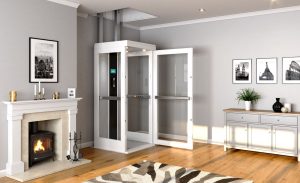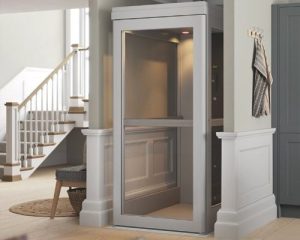- Types of elevators available: Shaftless (through the floor), freestanding, traction drive, chain drive, hydraulic drive, winding drum, roped drum
- Customization options: Depends on model; may include cab size, back-up battery, cab and fixture finishes, door and gate options, power door and gate operators, two exit doors, folding seat, keyed hall call station, remote control, in-cab telephone, and two to six stops
- Warranty: One-year warranty on labor; equipment warranties vary by manufacturer
- Weight capacity: 500–1,400 pounds, depending on model
- Installation time: Typically three to seven days, depending on model
- Safety features: Depends on model; may include emergency stop switch and alarm, safety brakes, battery-operated emergency lighting, manual or battery-operated emergency lowering, overspeed governor, lockable control panel, elevator door interlocks, slack rope or chain safety system, underpan and overhead sensors, non skid platform, and handrails
- Price: Starts at $35,000, which includes installation, tax, and shipping
Best Home Elevators in 2025: Reviewed by Our Experts
Key Takeaways
- We consider Lifeway Mobility the best home elevator dealer and installer because of its diverse product catalog, one-year labor warranty, and excellent customer reviews across dozens of locations.
- Home elevators start at around $35,000 but can cost more than $100,000 depending on the style and type of installation required.
- Elevators aren’t covered by original Medicare, but some funding may be available through Medicaid waivers or Medicare Advantage policies.
Most of us want to stay in our homes as we age, but this can be challenging when certain areas of the home become inaccessible. For example, you may no longer be able to walk up a flight of stairs to use the bathroom. A home elevator can be an effective solution, especially for people who use wheelchairs or other mobility aids.
With a variety of styles and sizes on the market, there’s a good chance your home can be modified to fit an elevator. The main limiting factor is price. Residential elevators start at $35,000, including installation, and aren’t covered by Medicare Part B.
Below, we’ll highlight our favorite dealer/installer and our favorite home elevator brand. We’ll also explain the benefits of installing a home elevator versus a stair lift.
Best Home Elevators in 2025
- Lifeway Mobility: Best Dealer and Installer
- Bruno: Most Versatile Installations
What we look for in home elevators
We found several important factors when reviewing home elevators, including:

Safety features
Emergency stop switches, a back-up battery, handrails, and other safety features prevent injuries, entrapment, and falls.

Installation type
Shaftless elevators save space in the home and require less construction, which keeps costs lower.

Weight capacity
A higher weight limit allows multiple people to use the elevator at once, or heavy items to be moved between floors.

Custom options
An elevator should look and work the way you want it to. We prefer brands with plenty of custom options.
Lifeway Mobility: Best home elevator dealer and installer
Our expert take on Lifeway Mobility
Lifeway Mobility sells and installs residential elevators from brands like Bruno, Savaria, Stiltz, and Wessex. With such a big catalog, Lifeway Mobility representatives can help you find an elevator that matches your needs. Options include space-saving shaftless elevators, luxury glass elevators, and hidden elevators that are tucked behind closet doors.
Several customizations and safety features are also offered, such as remote controls and battery-operated or manual emergency lowering systems. The exact features available will depend on the model you choose, but we appreciate seeing so many different options from one dealer.
Lifeway Mobility provides free quotes. A representative must visit your home to determine which type of elevator is possible to install and how much construction is necessary for the installation. For example, some elevators must be installed on a load-bearing wall. Others may require the construction of a channel called a hoistway. A Lifeway Mobility representative told us that most of their installations can be completed in three to seven days.
Lifeway Mobility has locations in 28 states. Enter your ZIP code on the top left corner of the website to find out if service is available in your area. Then, fill out a form on the website or call the customer service line at 888-589-8011 to schedule a free quote.
Our mobility expert’s take
Who may love it
- People with a budget of more than $35,000
- Anyone interested in visiting a showroom
- Those who want help selecting from a variety of models and features
Who may want to avoid it
- Those who don’t live in the service area
- People looking to spend less than $35,000
Customer reviews on Lifeway Mobility
Lifeway Mobility has 4.8 out of five stars from more than 2,400 customer reviews on Trustpilot. Many reviewers praise company representatives for their professionalism at every stage of the process.
“I would highly recommend Lifeway Mobility. I had a new three-floor elevator installed in a new Lakeside home my wife and I are building. It was a challenging site, and from the start of the planning to the installation the Lifeway team was on top of their game. Brett and his installation crew did a great job. They were competent, efficient, and courteous, worked well with my other trades on the job and were easy to work with. Great job.”
– Bill and Maureen, 6/24/2024
“Great service. The person who installed the elevator 17 years ago was the person who did the check up. Says a lot for the company when people stay for a long time.”
– Leonard C., 5/1/2023
Bruno: Most versatile home elevator installations
Our expert take on Bruno home elevators
Bruno Independent Living Aids manufactures a freestanding through-the-floor elevator in three sizes to suit your space:
- Compact: 21.25 inches by 29.50 inches inside the cabin
- Classic: 33.50 inches by 29.50 inches inside the cabin
- XL: 33.50 inches by 49.25 inches inside the cabin
Each has a weight capacity of 500 pounds, which is less than other home elevators on the market, and is designed to hold one person (Compact) or two people (Classic and XL).
Bruno elevators have glass on three sides and a track at the back. All moving parts are neatly housed behind panels above and behind the elevator. The elevator only travels between two floors and is designed to fit in small spaces if needed.
Installers must cut a hole in the floor for the elevator to travel through, but no hoistway or machine room needs to be built. This makes installation faster and less expensive compared to other types of elevators. A Bruno representative told us most of their home elevators can be installed in about four days—two days for site prep and two days for elevator installation—so most people are able to use their new home elevator within a week.
Bruno Independent Living Aids doesn’t sell elevators directly to consumers. You’ll need to go through a local dealer and installer, which you can find on the Bruno website. Our recommended dealer and installer is Lifeway Mobility, which operates in select ZIP codes in 28 states.
Our mobility expert’s take
Who may love it
- People in small homes
Who may want to avoid it
- Those looking for a specific design
- Anyone who wants an elevator with a weight limit greater than 500 pounds
- People who need an elevator that goes more than two floors
Customer reviews on Bruno
Bruno Independent Living Aids has 4.8 out of five stars from more than 3,200 customer reviews on Trustpilot. Several people thank the Bruno sales team for answering their questions without pressuring them to buy. Many reviewers also report positive experiences with local installation contractors.
“From sale to installation, it was a great experience. No high pressure at sale. The salesman and installers were professional, very nice, clean, friendly, etc. […] An excellent product and company to do business with. I highly recommend and thank everyone involved in this process”
– Richard H., 8/12/2024
“It was delivered and installed in the original timeframe I was given. A rarity these days.”
– Rosemary R., 8/12/2024
How we test home elevators
Our Reviews Team has dedicated more than 200 hours to evaluating mobility products like home elevators. We consulted with six health care professionals and mobility experts, mystery shopped 20 brands, and visited seven dealers to test products ourselves.
We’ve also surveyed 1,200 recent buyers to understand their experiences shopping for a mobility product like a home elevator.
We evaluate home elevators using an 18-step procedure to judge each one’s characteristics, including safety features, weight capacity, customization options, and other aspects many shoppers consider, according to our survey results.
We choose the best home elevator brands based on their test scores in the most important criteria. We identified the most important criteria based on our survey results and conversations with mobility experts.
How much do home elevators cost?
Home elevators cost $35,000–$100,000 or more, depending on the style and level of customization. “It’s a wide range because there are basic two-stop elevators that can be installed without construction. On the other hand, a traditional or glass elevator is much more expensive and typically requires a hoistway to be built for installation,” said a Lifeway Mobility representative we interviewed.
When shopping around, ask whether the price includes installation costs and shipping. There may be additional fees for construction permits and other miscellaneous costs that could increase the final price.
Paying for a home elevator
Medicare Part B doesn’t cover home modifications like elevators. If you have a Medicare Part C (Medicare Advantage) plan, check to see if you have coverage for home modifications. If so, it may cover home elevator installation.
If you’re eligible for Medicaid, your state may offer some financial assistance for a home elevator through a Home and Community Based Waiver.
You may also be able to use flexible spending account (FSA) or health savings account (HSA) funds to pay for a home elevator. Your doctor must write a letter saying the elevator is a medical necessity.
Benefits of installing a home elevator
A home elevator may allow you to continue living in a multi-story home if you can’t safely or comfortably walk up or down stairs.
A stair lift is one option, but installing a home elevator instead has somebenefits, such as being able to haul laundry, groceries, or other items in the elevator. If you’re interested in exploring stair lifts, our Reviews Team wrote about the best stair lifts based on our research and testing. People may also want to consider wheelchair lifts. These are platforms that transfer a person in a wheelchair from one place to another. We also reviewed the best wheelchair lifts.

“When I have been doing a lot of shopping, the elevator helps to get the stuff to the upper levels of my house.”
— Survey respondent, August 2024
People who use wheelchairs may also benefit from a home elevator more than a stair lift. With an elevator, there’s no need to transfer out of the wheelchair, into a lift seat, and into a second wheelchair—all of which takes time and increases the risk of falling. A home elevator is faster, safer, and more convenient in comparison, doesn’t require more than one wheelchair, and doesn’t require the assistance of a caregiver to help with transfers.

“If I had to do it over again, I’d probably invest extra money and install an elevator instead. It eliminates the need to transfer someone from a wheelchair to the stair lift and back again.”
— Valerie M., Bruno customer, 12/21/21 via Trustpilot.com
Finally, a home elevator may increase the value of your home or make it more attractive to buyers. “For high-end luxury homes or communities with a higher percentage of aging populations, the return on investment can be significant for an elevator because it’s perceived as a value-added feature,” said Daniel Cabrera, owner and founder of Sell My House Fast SA TX. “An elevator alone often makes the sale for buyers who are older or have some kind of mobility concern.”
One of the respondents to our August 2024 mobility survey confirmed this idea. “We bought an entire home so I could have an elevator,” they said.
Bottom line
Buying a home elevator could help you live comfortably in your home again. It’s a major investment, so finding the right company to work with is important. Our Reviews Team chose Lifeway Mobility as the best home elevator dealer and installer to help you choose and safely install the right model for your needs.
Frequently asked questions
Medicare Part B doesn’t cover the cost of home elevators because it’s a home modification, which is never covered under original Medicare. If you have a Medicare Advantage (Medicare Part C) plan, insurance may cover some expenses related to buying and installing a home elevator. State Medicaid waivers may also be available.
Home elevators are safe if they’re manufactured and installed according to the National Safety Code for Residential Elevators (ASME A17.1). Home elevators also come with safety features that ensure the cab can be lowered during a power outage, allow people to call for help from inside the cab, and prevent the elevator from moving if something blocks the door, underside, or top of the cab. Other safety features help prevent people from falling inside the cab, such as non-slip flooring, handrails, and fold-down seats.
An elevator may increase the value of your home, but there are no guarantees. Realtors we spoke to said there’s a better chance of seeing a return on your investment if you live in an area with a large population of older adults. Younger home buyers may see the elevator as superfluous, especially if it makes a small home feel cramped.
Questions? Email us at reviewsteam@ncoa.org.
Sources
- NCOA. Mobility Survey. 600 respondents. Conducted using Pollfish. Launched August 2024.




